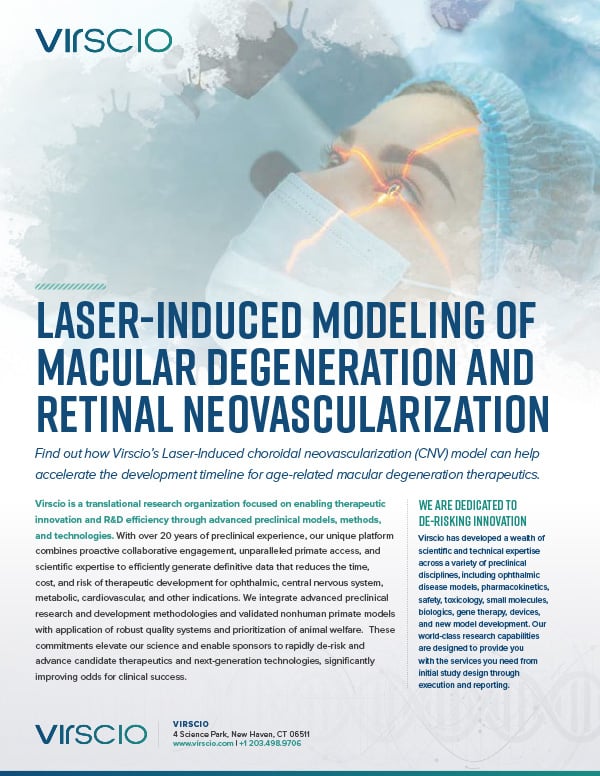Revolutionize Age-Related Macular Degeneration Research with Virscio's CNV Models
Harness Virscio’s Expertise in Ocular Research to Advance Macular Degeneration Therapeutics

Explore how Virscio's Laser-Induced Choroidal Neovascularization (CNV) Models can accelerate the development of therapeutics for age-related macular degeneration (AMD). Virscio, a translational research organization, leverages over 20 years of preclinical experience to enable therapeutic innovation and R&D efficiency. Utilizing advanced preclinical models, methods, and technologies, we focus on reducing the time, cost, and risk associated with the development of ophthalmic and other therapeutic areas.
In this overview, we spotlight Virscio’s approach to utilizing laser-induced CNV models in ocular research. Our model is effective for assessing treatment efficacy for wet AMD, diabetic macular edema (DME), and other retinal vascular diseases. The strategy involves using laser burns to induce choroidal neovascularization, simulating key aspects of wet AMD and other retinal diseases.
Learn about Virscio’s innovative laser-induced CNV models and how they can be instrumental in your research to develop effective treatments for macular degeneration and related conditions.
Discover Our CNV Models Now!
Learn about Virscio’s innovative laser-induced CNV models and how they can be instrumental in your research to develop effective treatments for macular degeneration and related conditions.
Virscio’s commitment to de-risking innovation is demonstrated through our extensive research capabilities, providing comprehensive services from study design to execution and reporting across various preclinical disciplines, including ophthalmic disease models.
In this overview of our Laser-Induced CNV Models, you will learn about:
- The experimental design and applications of our CNV models, including prevention and intervention strategies.
- How fluorescein angiography (FA) and optical coherence tomography (OCT) are used to evaluate lesion severity, vascular permeability, and size.
- The applicability of these models for efficacy studies of anti-neovascular and anti-fibrotic agents, as well as pharmacodynamic assessments.
